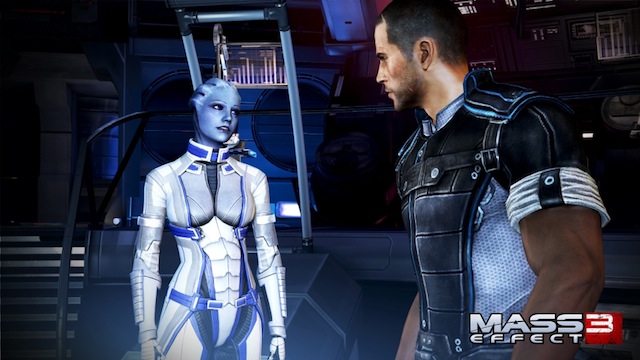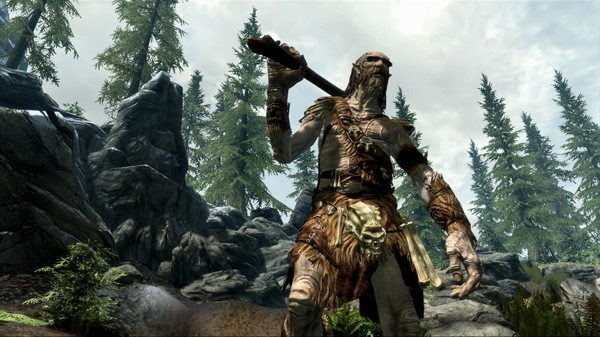“I used to be a Spectre, but then I took an Omni-Blade to the knee”. It was only four months ago that the internet was ablaze with talk of Skyrim. Songs of praise were heaped upon the saga of the Dovakiin when the time came for “Year In Review” and “Best Of 2011” lists. But the hot new action RPG is here in Mass Effect 3. How does last year’s blend of action and RPG stand up against this year’s hot ticket?
Bethesda and Bioware both make some damn fine games, and each company has helped define the Western Action RPG genre of gaming. Customizable characters, moral choices, a Hero’s Journey main story with endless side quests? All are hallmarks of both companies, whether it is Fallout, Elder Scrolls, The Old Republic or Mass Effect. But each company has its own style which is especially clear in their most recent games. Which of these blockbusters will be remembered best in the years to come?
The first Mass Effect game was a nightmare of inventory management, and the second game in the series fixed that a little too well, streamlining the Player’s selection of weapons down to just a handful. With Mass Effect 3, there’s a balance between the two styles, giving players five distinct kinds of guns, with several choices for each category, plus the option to add in mods.
Skyrim on the other hand runs rampant with items that players can collect, modify, and craft. It has the same degree of crafting and loot that one expects to see in a MMO, but with no marketplace for selling stuff to other players, it ends up with the Dovakiin carrying around a mountain of stuff. Skyrim has a clever way to encourage players to actually use all of this clutter, though; characters can level up by crafting! Forgoing the typical Experience Points system, Skyrim requires players to actually use a skill to get better at it. The process of crafting or even selling item will build up the skills used, thus pushing the character closer to the next level.
Mass Effect 3 sticks with experience points, and also uses the class-system, so each version of Commander Shepard can choose from a handful of skills to develop, and further special those skills as the game progresses. It’s still a far cry from the customization in Skyrim, and it’s clear that Mass Effect 3 has chosen accessibility over personalization.
The Mass Effect series has slowly morphed into a shooter franchise. In the first game, Commander Shepard would press up against walls and shoot from behind cover, but by the time 3 arrived, Shepard is leaping across gaps, sliding into cover, and dive-rolling across the battlefield like Captain Kirk. There’s even a stealth takedown!
Skyrim puts a greater emphasis on letting players choose how to approach situations. Shooting with magic or bows is viable, although often slow-paced. Melee is a bit more fleshed out, letting players block, parry and customized their attacks (Fireball and Dagger? Oh yes!). But Skyrim typically pits players against lone enemies or very small groups in slow, methodical combat. Mass Effect 3’s military action is much more fun, though rarely as rewarding as felling a giant after a massive battle.
Both games let the Player choose the path that their character takes through the world. Skyrim doesn’t bother with an alignment system, but rather uses a Faction system where the main character can earn the trust or hatred of each community individually. The world is a big place with many guilds and society’s to join, and while one location might welcome the Dovakiin, a nearby one might still be murderously outraged over that chicken you killed a month ago.
Mass Effect 3 skips “Good” and “Evil” using a Paragon and Renegade system. Essentially “Boy Scout” or “Dirty Harry”. Commander Shepard will be held accountable for the choices made over course of the game, but these tend to pile up near the final resolution of the story. All of the moral choices count towards a readiness rating for the final battle, and it often takes a while to feel the weight of your decisions in terms of gameplay, unlike Skyrim where getting caught picking a pocket can immediately escalate into a battle against the entire town.
But this long-term pay-off for moral choices is actually one of the most unique aspects of Mass Effect 3. Both it and Skyrim are sequels, but Skyrim is set long after the last Elder Scrolls game, standing as a completely self-contained story. Mass Effect 3 lets players carry over story decisions made in the previous two games. When viewed on it’s own terms it feels like it’s too heavy on the action, with a story structure that pushes players towards the endgame, rather than encouraging exploration. But when viewed as the third act of a story, Mass Effect succeeds in terms of making players feel the weight of their decisions, especially when choices made in the first game come back to haunt Shepard in the third.
While game scholars in the generations to come will likely hold Skyrim up as the best RPG of its generation, the Mass Effect trilogy will be regarded as one of the finest interactive stories of the decade.